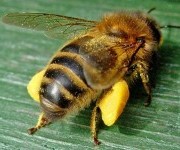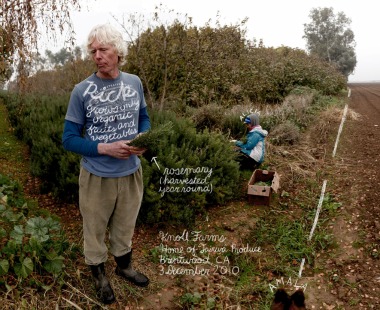Editor’s note: This is the first in a weekly installment of images from Douglas Gayeton and Laura Howard-Gayeton’s Lexicon of Sustainability. We’ll be running one image every Friday this winter, so stay tuned. There’s more where this came from!
Industrial agriculture = monoculture.
Small farms = biodiversity.
Small, organic farms like Rick Knoll’s are able to eliminate their reliance on petrochemical-based fertilizers and pesticides. The results are fewer pollutants, less environmental degradation, and cleaner air. And by using cover cropping and other soil fertilization principles they are able to sequester carbon and keep topsoil — which is carbon heavy — from being lost into the atmosphere (the latter also contributes to climate change).
Biodiversity
Weeds + trees + crops + critters + soil = An integrated food web allowing biota to self-regulate = A self-regulating, multi-layered farm that requires little maintenance and no pesticides.
Additional text taken from the photograph:
The conventional farmer next door¹ calls Rick’s organic methods “dirty farming” (they’re “clean”). Each winter their fields sit idle for months at a time. Since no cover crop is planted (a process that returns nutrients to the soil and increases fertility), the soil remains exposed to the elements. Wind erosion will carry some of this precious top soil away and, in so doing, release carbon back into the atmosphere.
About Rick Knoll
Rick Knoll is an organic farmer who has been practicing biodynamic farming for 32 years. He owns Knoll Farms in Brentwood, Calif., and holds a Ph.D in Organic Chemistry from UC Irvine. He has also studied Agroecology at UC Santa Cruz. Learn more on the Knoll Farms website.
This image was made possible with generous funding from Google.



